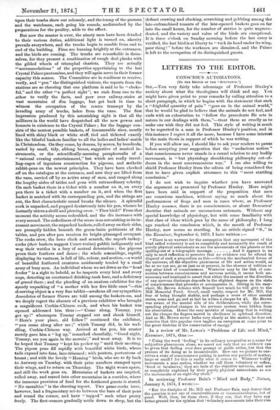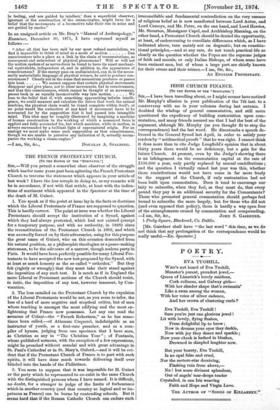LETTERS TO THE EDITOR.
CONSCIOUS AUTOMATONS.
(TO THE EDITOR OF THE "SPECTATOR.")
Sia,—You very fairly take advantage of Professor Huxley's anxiety about what the theologians will think and say. You might have given point to your remarks by calling attention to a short paragraph, in which he begins with the statement that such a "frightful quantity of pain" "goes on in the animal world," that he would be glad to believe that the animals do not feel, and ends with an exhortation to "follow the precedents He sets in nature in our dealings with them,"—treat them so cruelly as to make one wish they did not feeL This style of writing is much to be regretted in a man in Professor Huxley's position, and in this instance I regret it all the more, because I have some interest in the main thesis in support of which he was writing.
If you will allow me, I should like to ask your readers to pause before accepting your suggestion that the "audacious notion" that consciousness never stands in a causal relation to any bodily movement, is "but physiology shouldering philosophy out-of- doors in the most unceremonious way." I am also willing to shield Professor Huxley from the odium of being considered the first to have given explicit utterance to this "most startling conclusion."
I do not wish to inquire whether you have answered the argument as presented by Professor Huxley. More might have been said in support of the proposition that men are conscious machines, without saying so much about the performances of frogs and men in cases where, as Professor Huxley assumes, there is no consciousness, or about Descartes' doctrine that animals are unconscious automata. Without any special knowledge of physiology, but with some familiarity with that class of ideas which goes by the name of philosophy, I long ago reached the conclusion which, in the mouth of Professor Huxley, now seems so startling. In an article signed "S.," in the Examiner, September 6, 1873, I have written :— " There is no warrant for the assumption that any movement of the kind called voluntary is not as completely and necessarily the result of purely physical antecedents as aro the movements of the planets or the spelling-out of a telegraphic message And it appears to us only to need reflection to perceive that no evidence can be offered in disproof of such a proposition as this :—Givon the mechanical forces of the universe, all the objective phenomena of life and action would, so far as we can see, go on just as at present, in the absence of volition or any other kind of consciousness. Whatever may be the link of con- nection between consciousness and nervous action, it seems both un- necessary and irrational to assert that either the amount or the direction of any nervous discharge depends in the slightest degree on the state of consciousness that precedes or accompanies it. Sitting in his easy- chair, Mr. Brown debates with himself how much he will give to the Mill Memorial Fund. Greed, small vanity, respect for Mr. Mill, the fear of being thought shabby, and perhaps a score of other mental states, come and go, and at last he writes a cheque for £5. Mr. Brown was aware of the mental side of his deliberations, while the corre- sponding physical changes in his nervous system were hidden from his observation. Hence the easy mistake of supposing that in writing out the cheque the fingers moved in obedience to spiritual direction. And as Mr. Brown never looks very closely at the matter, ho does not perceive that this popular view implies an exception at some point to the great doctrine of the conservation of energy."
In a review of Mr. Lewes's "Problems of Life and Mind," Examiner, 1874, thus :— " Using the word 'feeling' in its ordinary acceptation as a name for subjective phenomena alone, we assert not only that no evidence can be given that feeling ever does prompt or guide action, but that the process of its doing so is inconceivable. How can we picture to our- selves a state of consciousness putting in motion any particle of matter, largo or small ? for this is really what it comes to. Whatever bodily movements a man makes, whether we call them voluntary or reflex, 'fixed or faculative; they are facts of the objective universe, and are as completely explained by their purely physical antecedents as are the movements of an eight-day clock."
In reviewing Professor Bain's "Mind and Body," /Velure, January 8, 1874, I wrote :—
" But the disciples of Mr. Mill and Professor Bain may demur that the question is not one of conceivableness or inconceivableness, but of proof. Well, then, let them show, if they can, that they have any better ground for the opinion that 'voluntary movements take their rise in feeling, and are guided by intellects' than a superficial observer, ignorant of the construction of the steam-engine, might have for a belief that the movements of a locomotive take their rise in noise and are guided by smoke."
In an unsigned article on Mr. Bray's "Manual of Anthropology," Examiner, December 30, 1871, I have expressed myself as follows :— " After all that has been said by our most refined materialists, we
find it impossible to think of mind as a mode of motion. Can consciousness take a place as a link in the chain of transmutations, as consequent and antecedent of physical phenomena? Will or will not the motion spoken of as nerve-force be found to have its exact mechani- cal equivalents, independent of, and in addition to, the appearance of consciousness? If the energy pass on undiminished, can it, in the neces- sarily materialistic language of physical science, be said to produce con- sciousness? Clearly not in the sense that momentum produces or passes
into heat. We cannot suppose that certain physical movements disappear and give 'place, not to other movements, but to consciousness, and that this consciousness, which cannot be thought of as movement,
passes back in an equally inconceivable way into motion We lean to the belief that if, with something approaching infinite intelli- gence, we could measure and calculate the forces that work the animal machine, the physical chain would be found complete within itself; at no point would the extinction of any kind of movement have to be accounted for by the supposition that it had passed into intangible mind. This idea may be roughly illustrated by imagining a machine of human construction in the working of which a measured force is applied and fully accounted for, but which machine, while in motion, is always surrounded by a brilliant light of supernatural origin. For an analogy we must make some such supposition as that consciousness, though we are unable to perceive any indication of it, actually accom- panies the working a steam-engine."
—I am, Sir, &c., DOUGLAS A. SPALDING.



































 Previous page
Previous page